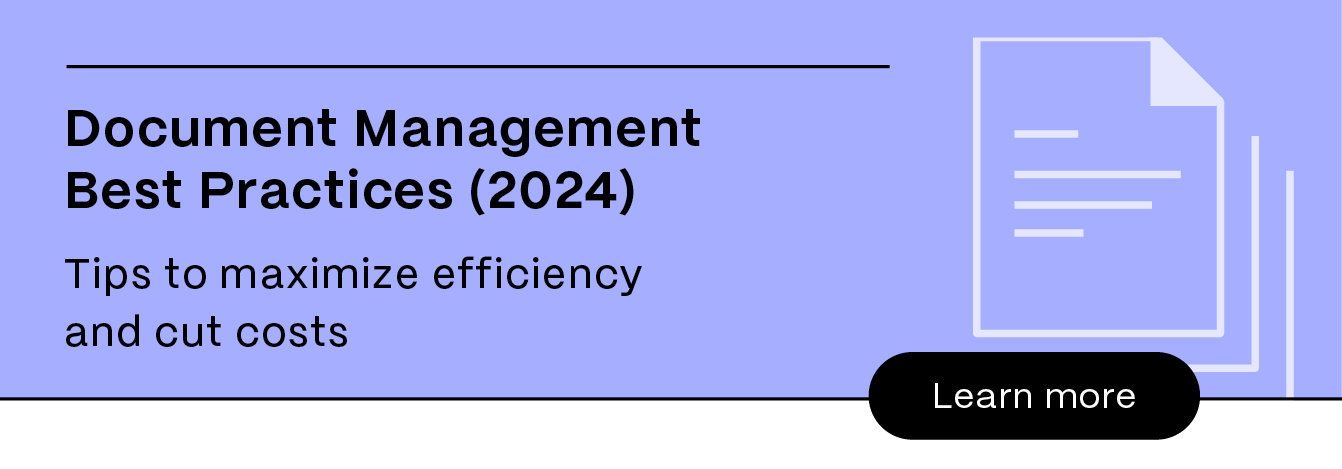
Blog
Top 11 benefits of document management in healthcare

From patient records and appointment reminder templates to waivers and employee resources, healthcare organizations produce a lot of documents. Many of these contain sensitive information that must be protected to uphold patient privacy and legal requirements. However, relying on paper documents can hold organizations back and impede patient care.
In order to meet the unique challenges of healthcare document management, organizations need to go digital with a reliable, secure software solution. A secure platform provides many advantages for busy healthcare professionals looking for a better way to handle files. In this article, we cover the top 11 benefits of a digital document management system in healthcare.
1. Greater efficiency
Digital document management leads to improved, streamlined access to information for quicker healthcare decision making. Health organizations typically store a large number of files, which makes searching for documents within a paper-based system overly time-consuming.
Digital document management platforms typically include a search functionality that quickly pulls up the information healthcare workers need. This makes patient care more efficient. For example, by using a digital system, nurses can instantly find a patient’s past lab results for timely confirmation of what tests still need to be run.
2. Heightened productivity
With effective digital document management, healthcare staff get more done on behalf of patients. The efficiency of a digital system lets providers spend less time searching through files and more time caring for patients.
Automation boosts productivity by reducing the administrative burden of document management. Healthcare document management & automation, for instance, can streamline employee onboarding. With automated onboarding workflows, healthcare staff can fill out required forms, organize new-hire materials, and start caring for patients faster.
Related read:How to quickly find weak points in your workflow
3. Improved collaboration
Digital documents are easier to update and access, so using a document management platform improves how information is communicated between staff members.
It’s important that all members of a healthcare team continually communicate and collaborate in order to stay on top of a patient’s evolving care plan. In a hospital setting, changes that happen overnight need to be promptly and accurately relayed to the day shift to ensure the patient’s continuity of care.
By maintaining documents in a central digital hub complete with features such as messaging and comments, healthcare teams can stay synchronized to improve care outcomes.
4. Enhanced security
With the right data security features, digital document management protects patients and hospitals from the devastating consequences of a breach.
Two major healthcare security breaches occurred in the first half of 2024. The most devastating is predicted to impact one-in-three Americans and cost at least $2.3 billion. This highlights the importance of using advanced security features to protect patient data.
Paper documents are vulnerable to unauthorized access, alteration, or destruction. It’s impossible to prevent bad actors from stealing sensitive information once they have physical copies of records. Digital documents have additional measures for more secure healthcare records management. These include:
- Encryption: Using 256-bit encryption prevents hackers from interpreting patient data if they get into files by force.
- Access controls: Designating which users can view and make changes to a file makes it inaccessible to cybercriminals.
- Password protection: Requiring a password for certain documents adds an additional layer of security to protect the most sensitive information.
- Audit trails: Automatically recording when and how users access a file helps healthcare organizations detect suspicious activity.
Related read: Great security doesn't have to get in the way of a great user experience
5. Increased compliance
Healthcare providers can more easily meet and uphold changing regulatory requirements with digital document management. This lowers the possibility of facing fines and other legal penalties.
To understand the impact of this, consider the Health Insurance Portability and Accountability Act (HIPAA). HIPAA is the most important regulation governing how healthcare organizations are required to protect data, and takes precedence over state laws. Violating its requirements can lead to civil and criminal penalties that range from $100 to $5,000, depending on an organization’s previous awareness of an issue and actions to correct it.
Responsible digital document management helps adhere to HIPAA, avoiding any violations related to:
- Document security: Quality document management systems will meet HIPAA’s security requirements for digitally stored information. A solution with strong encryption ensures compliance.
- Patient access: Under HIPAA, patients have the right to view their records upon request. With a digital system, it’s simple to store and deliver those files securely.
- Compliance updates: Using a solution with built-in HIPAA compliance provides peace of mind that updates to the regulation will be accounted for automatically.

6. Cost savings
From reducing costs associated with paper documents to lowering the risk of fines from non-compliance — the financial benefits of digital document management are clear. The healthcare industry’s heavy reliance on paper costs around $300 billion annually. Using a digital system is one of the best ways to cut costs, especially when taking its other benefits into consideration.
The right document management platform enables costs savings by allowing you to:
- Spend less money on physical copies of documents — including storage, printing and mailing costs.
- Improve efficiency, allowing staff to get more out of existing resources.
- Avoid fines resulting from security breaches or regulatory violations.
Related read: What is poor document management costing you?
7. Sustainability
Reducing paper usage with digital document management is a better environmental decision. 15 billion trees are cut down each year, which has serious consequences for the planet. While paper isn’t the main cause of deforestation, avoiding its use can still make an impact, especially for healthcare organizations that produce a large quantity of documents. Aside from being the right thing to do, this environmentally sustainable choice is likely to resonate with staff and patients, increasing satisfaction with your organization.
8. Protection against data loss
Physical documents can be misplaced or damaged, but storing files digitally creates a reliable backup and preserves information so it’s easy to find. Health organizations must maintain patient records for five to eleven years, depending on the state and the type of data involved. Document management systems safeguard legally required records and lift the burden of maintaining these in a paper format.
A disaster such as a fire or flood may destroy paper documents, but with cloud-based storage, files are safe even if physical systems and storage units are damaged. Furthermore, the search functionality within document management systems prevents files from getting lost.
9. Scalability
A digital document management platform with cloud storage allows healthcare organizations to stay efficient as data increases.
The U.S. population is aging, leading to an increased demand for healthcare services. By 2034, inpatient utilization is expected to rise 3%, while outpatient utilization will jump 17%. This speaks to the need for healthcare companies to grow and adopt scalable solutions.
As paper documents accumulate, these create clutter and disorganization. Digital document management keeps high volumes of documents secure and organized as new patients and providers arrive. It helps ensure a practice can expand and keep providing excellent care with no loss of efficiency from manual and paper-based workflows that aren’t as scalable.
10. Fewer errors
Digital document management improves the accuracy of patient documentation, lowering the possibility of medical errors. Error reduction is a critical goal within the healthcare system, as several studies over the past decade have attributed thousands of deaths to preventable harm. Mistakes in medical documentation in particular can lead to a patient receiving the wrong medication or operating on the wrong body part.
The reasons for errors to occur, even with capable care teams, are complex and multifaceted. However, keeping documents ordered and easily accessible in a digital platform with collaboration features reduces risk. It also empowers health teams to catch issues and stay on top of updates to treatment plans.
11. Higher staff and patient satisfaction
Digital document management platforms boost staff and patient satisfaction by increasing care efficiency and the transparency of medical records.
Paper-based document management involves tedious manual effort that slows down care delivery and leaves healthcare professionals feeling frustrated. With a digital platform, staff have a more efficient way of storing and accessing the documents they need to do their jobs effectively.
Patients appreciate this as well. For instance, when someone wants a copy of their medical records, a document management system makes it simple for staff to quickly provide a digital version. Locating physical copies of documents takes longer, and providing these to patients requires time-consuming steps like photocopying and mailing. Digital document management makes it more convenient for patients to find information they’re looking for.

Better healthcare records management starts with you
There are many examples of how the healthcare industry benefits from document management systems. Ultimately, these benefits contribute to the most important goal for any healthcare organization: more efficient, cost-effective, and successful patient care.
Digital document management lets providers find and update files faster, saving time and ensuring patient information is consistently accurate. Convenient data access and automation that takes over tedious tasks can boost satisfaction for both staff and patients. Digital platforms also improve collaboration, reduce errors, and save money.
The positive impact of digitalization makes it clear why healthcare organizations continue to need document management systems designed for the modern age. Discover the benefits for yourself. Harness the power of digital document management and take your healthcare organization to new heights.
Related Resources
